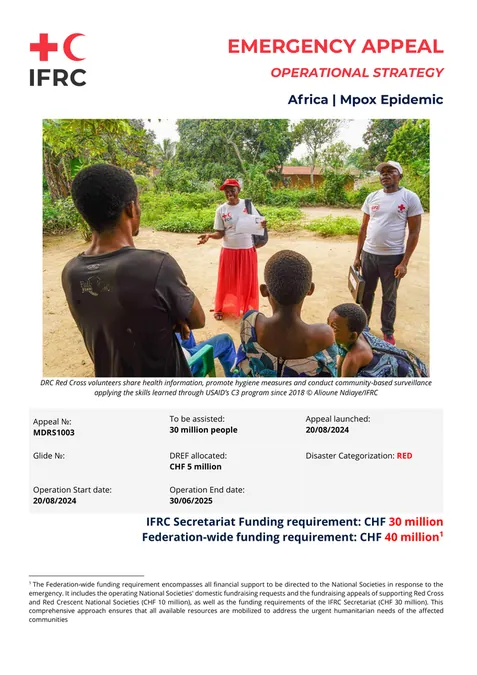
Shocking Surge in Mpox Cases in Africa: A Closer Look at the Outbreak Threatening Millions
2024-10-01
In a dire situation escalating across Africa, the mpox epidemic has emerged as a major public health crisis, with the Democratic Republic of the Congo (DRC) at the epicenter. Over 25,000 suspected and confirmed mpox cases have been reported in just the first quarter of 2024, representing a staggering 180% increase from the previous year, alongside 32 confirmed deaths. Alarmingly, DRC alone accounts for 90% of the continent's cases, highlighting the urgency for a coordinated response.
As of early 2024, April witnessed a worrying spike in mpox cases in Equateur province and other areas, followed by a surge in the eastern regions of DRC that are not traditionally known to have mpox. The outbreak has not only threatened locals but also sparked cross-border transmissions into neighboring countries such as Burundi, Rwanda, and Uganda. With these countries reporting rising cases, the looming question is whether this epidemic can be contained.
The World Health Organization (WHO) and the Africa Centres for Disease Control and Prevention (AfCDC) have declared the mpox outbreak a public health emergency of international concern, prompting an emergency appeal from the International Federation of Red Cross and Red Crescent Societies (IFRC) for CHF 40 million to aid 30 million people affected and at risk by the epidemic.
The complexity of the outbreak is heightened by the emergence of two different genetic clades: Clade 1 and Clade 2. Clade 1, particularly associated with severe disease and higher mortality rates, has been spreading rapidly, especially Clade 1b, first identified in the DRC in September 2023. This clade has shown alarmingly high transmission rates among vulnerable populations, especially sex workers and children, highlighting a disturbing trend of widespread transmission that is newly arising in both endemic and non-endemic regions.
What exacerbates the situation is the limited access to healthcare and preventive measures across Africa, where poverty and strained resources make it nearly impossible to effectively combat the outbreak. Countries like Cameroon, Cote d’Ivoire, and the Central African Republic are witnessing either slow expansion or re-emergence of outbreaks. In parallel, the lingering global mpox epidemic continues to ripple through countries, spreading havoc and raising fears of sustained community transmission.
But what is the driving force behind this escalating health emergency? Experts are increasingly pointing to the profound impacts of climate change and environmental destruction on zoonotic diseases—viruses that leap from animals to humans like mpox. Rising temperatures, deforestation, and ecosystem degradation promote greater interactions between wildlife and human populations, creating perfect conditions for outbreaks to spark. The WHO’s One Health initiative emphasizes the urgency of addressing these environmental factors to mitigate the spread of diseases like mpox.
Despite the grim outlook, there is hope. Collaborative efforts to strengthen healthcare systems, enhance trust within communities, and improve responses to public health emergencies are crucial. However, addressing the staggering rise in mpox cases will require immediate action and comprehensive strategies to tackle both the health crisis and the environmental issues fueling it.
In a world increasingly interconnected—and fragile—the need for vigilance, preparedness, and a proactive stance against emerging threats has never been more critical. As healthcare systems brace themselves for ongoing challenges, the spotlight remains on Africa—a continent that must be supported to combat this urgent and potentially devastating outbreak. Stay tuned for the latest updates as this story continues to unfold!




 Brasil (PT)
Brasil (PT)
 Canada (EN)
Canada (EN)
 Chile (ES)
Chile (ES)
 España (ES)
España (ES)
 France (FR)
France (FR)
 Hong Kong (EN)
Hong Kong (EN)
 Italia (IT)
Italia (IT)
 日本 (JA)
日本 (JA)
 Magyarország (HU)
Magyarország (HU)
 Norge (NO)
Norge (NO)
 Polska (PL)
Polska (PL)
 Schweiz (DE)
Schweiz (DE)
 Singapore (EN)
Singapore (EN)
 Sverige (SV)
Sverige (SV)
 Suomi (FI)
Suomi (FI)
 Türkiye (TR)
Türkiye (TR)